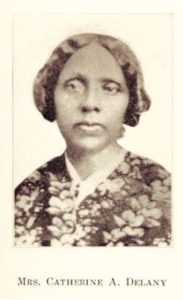
*Catherine A. Delany was born on this date in 1822. She was a Black abolitionist.
Born Catherine A. Richards in Pittsburgh, she was the daughter of Charles Richards, a Black man, and Felicia Fitzgerald, an Irish white-American native of Cork, Ireland. Before the Gradual Abolition Act of 1780, intermarriage between races had been forbidden in Pennsylvania, but with the act's passing, the law was nullified. Young Richards was part of an elite Black family, one of the oldest and wealthiest in Pittsburgh. Her father was the son of Lucy and Benjamin Richards, known to many as “Daddy Ben,” a man of substantial wealth and property and a well-established butcher in the colonial era.
An early settler, Benjamin Richards, had crossed the Alleghenies when Pittsburgh was just a village. He made substantial profits as a butcher and supplier of meat to the military. In 1810, the census for Allegheny County reported Benjamin as head of a free household of six. According to Hallie Q. Brown, in her book Homespun Heroines and Other Women of Distinction, Benjamin “erected and owned the first brick building in Pittsburgh where court sessions were held for many years.” His estimated worth was a quarter of a million dollars. Unfortunately, lawyers working for envious white businessmen disputed his legal possession of deeds. As a result, the bulk of Benjamin’s fortune did not go to his heirs. His son, Charles, owned a leading tavern and provided his family with a comfortable and respectable life but never acquired similar wealth.
On March 15, 1843, at 21, Catherine married aspiring physician Martin R. Delany at the Bethel African Methodist Episcopal (AME) Church on Front Street. During this same year, Delany established The Mystery newspaper. Catherine Delany helped her husband find agents to sell subscriptions in various cities. She and other black women in the community “held a soiree for the benefit of the newspaper.” This event was held yearly on August 1 (the anniversary of the abolition of slavery in the British West Indies) in Arthur’s Grove, located just outside the city. Although for many, the Fourth of July was a holiday to commemorate the birth of the United States, many Black and white abolitionists didn’t observe it, given that many Americans were still in bondage. They celebrated on August 1 instead. During the great fire of 1845 that destroyed much of Pittsburgh, Delany helped feed homeless families who were given shelter in the courthouse and other places.
The AME Church on Front Street was destroyed, as was John Vashon’s barbershop and home. The Delanys’ former home had also been destroyed by fire. In 1856, Catherine Delany moved with her husband and family to Chatham, Ontario, which housed a colony of Blacks from America near Detroit. By 1864, the Delanys resettled in Wilberforce, Ohio, where they educated their children. It was here that Catherine Delany died in 1894.